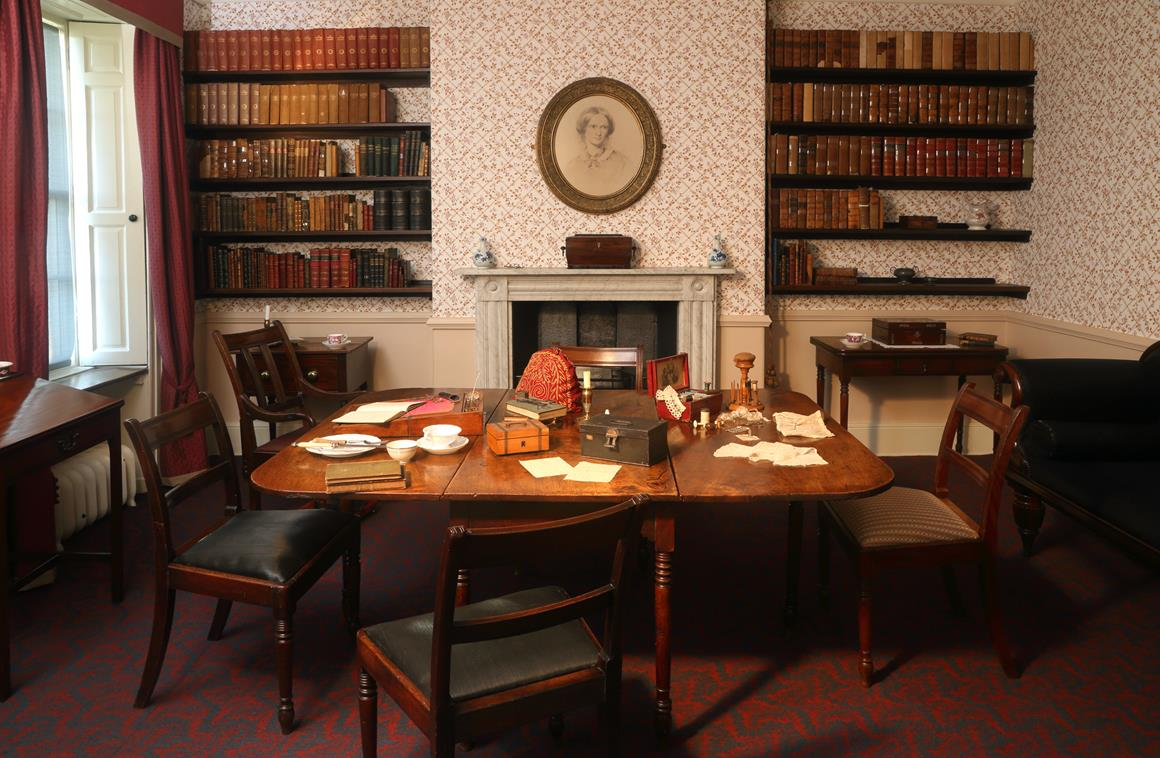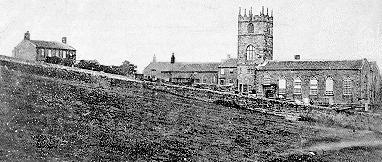Charlotte's own accounts of this courtship and eventual engagement, given in her letters to Ellen Nussey as it went along, could not be bettered in the finest novel in the world. Mr. Bronte's jealous fury, expressing itself as snobbish resentment - a curate with £100 a year marry his famous daughter! Mr. Nicholl's stubborn passion, which almost unseated his reason - he would not eat or drink; stayed shut up in his lodgings at the Browns' (though he still took poor old Flossy out for walks); broke down in the Communion Service, while the village women sobbed around; was rude to a visiting Bishop; resigned his Haworth curacy and agreed to remain till Mr. Bronte found another curate; volunteered as a missionary to Australia but finally took a curacy at Kirk Smeaton, in the West Riding itself. Charlotte, exasperated by Nicholl's lack of the qualities she desired in a husband, infuriated by her father's ignoble objections to the match, conscious of the absence of alternatives. The villagers, torn between opposing parties - some say they would like to shoot Mr. Nicholls, but they gave him a gold watch as a parting present. What a tragic drama - or a roaring comedy, depending on its result. Love, coupled with Charlotte's loneliness and Mr. Bronte's dissatisfaction with his new curate, Mr. De Renzi, triumphed." bronte_Charlotte
Reverend Arthur Bell Nicholls, who had been licensed to the curacy of Haworth in June 1845, had first professed his affection for Charlotte Brontë in December 1852, to the great disapproval of her father Reverend Patrick Brontë. Charlotte consequently refused him, and Nicholls left for a curacy at Kirk Smeaton near Pontefract. He continued to write to Charlotte, and while she initially did not respond to his letters, they gradually developed a clandestine correspondence, and met secretly whenever Nicholls stayed with the family of Reverend Joseph Brett Grant near Haworth. Patrick Brontë gradually though grudgingly increased his acquaintance with Nicholls and eventually consented to a marriage between him and Charlotte.brontes-1854
Reverend Joseph Brett Grant
As the population had increased because of the mills, the Rev. Patrick Bronte of Haworth sent his curate, the Rev. Joseph Brett Grant to start the church in Oxenhope. He had to hold services in a house at the top of the catsteps, although nobody now knows which one it was. He was allowed to perform baptisms, but marriages and funerals could only take place in a church. As a school and vicarage were needed as well as a church, it was decided to build the school first. This was completed in 1846, and services were held there. The Rev. Brett Grant raised money by approaching people, telling them he needed money to build a church, holding out his hand and asking them how much they would give him. Charlotte Bronte described him in her novel 'Shirley' under the name of the Rev. Don, adding that he had walked so far he had worn out 14 pairs of shoes! She quite rightly described him as 'the champion beggar'. As a result of his persistence, the foundation stone was laid on 14 February 1849 and the finished building was consecrated by the Bishop of Ripon on 11 October 1849 OxenhopeVillage/history
Reverend Arthur Bell Nicholls, who had been licensed to the curacy of Haworth in June 1845, had first professed his affection for Charlotte Brontë in December 1852, to the great disapproval of her father Reverend Patrick Brontë. Charlotte consequently refused him, and Nicholls left for a curacy at Kirk Smeaton near Pontefract. He continued to write to Charlotte, and while she initially did not respond to his letters, they gradually developed a clandestine correspondence, and met secretly whenever Nicholls stayed with the family of Reverend Joseph Brett Grant near Haworth. Patrick Brontë gradually though grudgingly increased his acquaintance with Nicholls and eventually consented to a marriage between him and Charlotte.brontes-1854
Reverend Joseph Brett Grant
As the population had increased because of the mills, the Rev. Patrick Bronte of Haworth sent his curate, the Rev. Joseph Brett Grant to start the church in Oxenhope. He had to hold services in a house at the top of the catsteps, although nobody now knows which one it was. He was allowed to perform baptisms, but marriages and funerals could only take place in a church. As a school and vicarage were needed as well as a church, it was decided to build the school first. This was completed in 1846, and services were held there. The Rev. Brett Grant raised money by approaching people, telling them he needed money to build a church, holding out his hand and asking them how much they would give him. Charlotte Bronte described him in her novel 'Shirley' under the name of the Rev. Don, adding that he had walked so far he had worn out 14 pairs of shoes! She quite rightly described him as 'the champion beggar'. As a result of his persistence, the foundation stone was laid on 14 February 1849 and the finished building was consecrated by the Bishop of Ripon on 11 October 1849 OxenhopeVillage/history



Charlotte's own accounts of this courtship and eventual engagement, given in her letters to Ellen Nussey as it went along, could not be bettered in the finest novel in the world
BeantwoordenVerwijderenIndeed. But the tragedy for us today is Charlotte and Ellen had a huge falling out in June 1853 and the letters between the women stopped for 6 months...for the first time in 25 years.
Ellen was visiting Haworth at the end of June 1853. She was shocked to learn not only was Mr. N still on Charlotte's radar, Charlotte was carrying on a correspondence with him and no longer set against the idea of the marriage
Ellen lost her head. She lost her head to the point where she left Haworth in a huff and wrote complaing letters to others ( Mary Taylor Mary Hewitt etc)
When Miss Wooler urged Charlotte to heal the breach, Charlotte wrote " I hardly know how to take the step you suggest "
Hard words must of been exchanged
And so this why just how and when Charlotte and Mr. Nicholls came together is so murky...we have no letters to Ellen letters to chart the last 6 months.
It was only when Miss Wooler told Charlotte Ellen was ill and Charlotte had already decied on marrying Mr. Nicholls that the letters started again.
And even so the letters did not mention Mr.Nicholls until "somehow" Charlotte mixed up her letters to Ellen and Arthur , sending each the letter meant for the other.
When this mix up happened, Arthur was a fact of her life and Charlotte was free to gave Ellen a summing up. But that's not at all the same as reports in real time would have been for us today
So we see Charlotte's closest associates, her father and Ellen, were so foolish as to angry demand she choose them over Mr. Nicholls
Well that's how they put it. But how Charlotte heard it was as a demand for her to choose thier wants over her judgment and instantly .
Very foolish. Of course Charlotte chose her own judgment over these outlandish demands.
Arthur Bell Nicholls was the happy beneficiary of thier mistake. If they wanted to chase Charlotte into Mr. Nicholls arms, they could not have hatched a finer plan.
It was Miss Wooler who stood by Charlotte though out this ordeal as she found her own way and some of Charlotte's best letters of her last year are written to Miss Wooler.
Miss Wooler is also given a warmer picture of Charlotte's marital happiness than Ellen because she was not against the match, nor jealous of the husband.
Miss Wooler was for whatever Charlotte decided was best for herself. A real friend